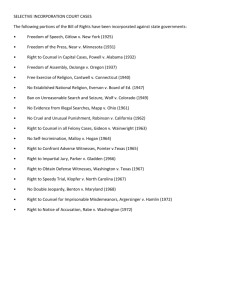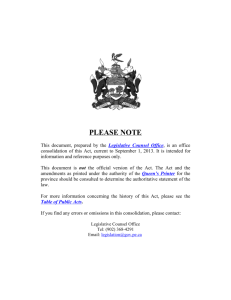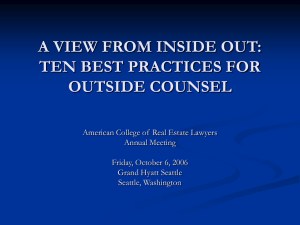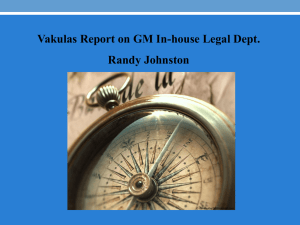Advance Questions for Mary Walker
advertisement
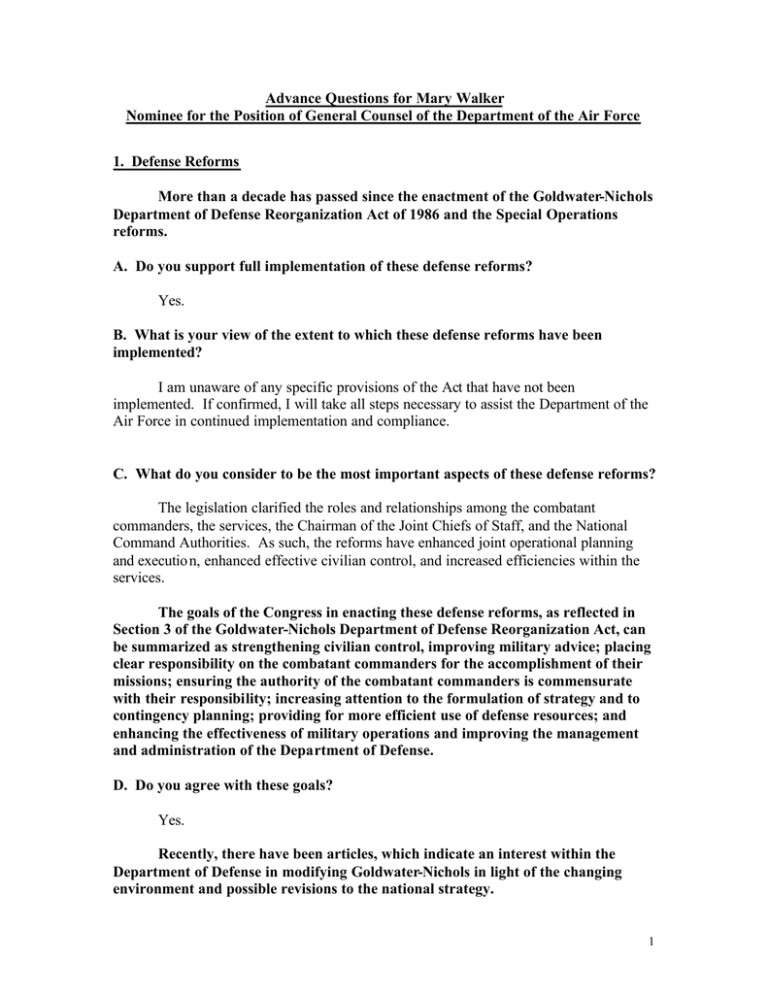
Advance Questions for Mary Walker Nominee for the Position of General Counsel of the Department of the Air Force 1. Defense Reforms More than a decade has passed since the enactment of the Goldwater-Nichols Department of Defense Reorganization Act of 1986 and the Special Operations reforms. A. Do you support full implementation of these defense reforms? Yes. B. What is your view of the extent to which these defense reforms have been implemented? I am unaware of any specific provisions of the Act that have not been implemented. If confirmed, I will take all steps necessary to assist the Department of the Air Force in continued implementation and compliance. C. What do you consider to be the most important aspects of these defense reforms? The legislation clarified the roles and relationships among the combatant commanders, the services, the Chairman of the Joint Chiefs of Staff, and the National Command Authorities. As such, the reforms have enhanced joint operational planning and executio n, enhanced effective civilian control, and increased efficiencies within the services. The goals of the Congress in enacting these defense reforms, as reflected in Section 3 of the Goldwater-Nichols Department of Defense Reorganization Act, can be summarized as strengthening civilian control, improving military advice; placing clear responsibility on the combatant commanders for the accomplishment of their missions; ensuring the authority of the combatant commanders is commensurate with their responsibility; increasing attention to the formulation of strategy and to contingency planning; providing for more efficient use of defense resources; and enhancing the effectiveness of military operations and improving the management and administration of the Department of Defense. D. Do you agree with these goals? Yes. Recently, there have been articles, which indicate an interest within the Department of Defense in modifying Goldwater-Nichols in light of the changing environment and possible revisions to the national strategy. 1 E. Do you anticipate that legislative proposal to amend Goldwater-Nichols may be appropriate? If so, what areas do you believe it might be appropriate to address in these proposals? I am not currently aware of any Department of Defense sponsored legislative proposals to amend the Goldwater-Nichols Act. If confirmed, I will be in a better position to carefully review and evaluate possible changes in light of the overall objectives of the Act. 2. Duties A. What is your understanding of the duties and functions of the General Counsel of the Department of the Air Force? The General Counsel is the chief legal officer of the Department of the Air Force. As such, the legal opinions issued by the General Counsel are the controlling legal opinions within the Department. The General Counsel provides legal advice and guidance to the Secretary, the Under Secretary, the Assistant Secretaries, their staffs, and other offices within the Office of the Secretary, as well as to the Chief of Staff and the rest of the Air Staff. The General Counsel also provides legal services throughout the entire Department in a variety of disciplines including fiscal law, ethics, contract law, environmental law, international law, intellectual property law, real property law, personnel law, labor law, and litigation. The General Counsel also serves as the Designated Agency Ethics Official, the Suspending and Debarring Official for the Department of the Air Force, and exercises oversight of intelligence and other sensitive activities and investigations. B. What background and experience do you possess that you believe qualifies you to perform these duties? I have practiced law for more than 20 years specializing in environmental and land use law and litigation, including interpretation and negotiation of government regulations. I have also worked on other matters, including business litigation, real estate, mergers and acquisitions and labor (Title VII) matters. In the course of serving the Reagan Administration at the Departments of Justice and Interior, I supervised in excess of 100 government lawyers and worked closely with Defense Department lawyers on major cases affecting government lands. I am comfortable advising and briefing senior officials on legal issues and enjoy working as a part of a team, cultivating the talents in the career staff who serve so faithfully. I have also served on several international delegations and on an international commission. As Assistant Secretary for Environment, Safety & Health of the Department of Energy, I was responsible for the safety oversight of the nuclear weapons program, and in this capacity, worked closely with the nuclear Navy on radiation standards applicable to the Navy Department. 2 In private practice, I have advised CEO’s, businesses and local governments of their obligations under law and the options they have in order to creatively accomplish their goals. I understand the tough decisions that must sometimes be made when competing interests are involved. I believe this experience has equipped me to serve the Department of the Air Force and my country in this role. C. Do you believe that there are actions you need to take to enhance your ability to perform the duties of the General Counsel of the Department of the Air Force? I believe I have the necessary legal training, experience and leadership abilities to be the General Counsel. If confirmed, I will benefit from the extraordinary talent, expertise and experience of the civilian and military lawyers in the Department as I broaden my understanding of the issues the Air Force faces every day. D. Assuming you are confirmed, what duties and functions do you expect that Secretary Roche would prescribe for you? If confirmed, I anticipate Secretary Roche will expect me to provide timely, accurate, and candid legal advice and counsel, ensuring compliance with the law and the protection of the legal prerogatives of the Department. I expect the duties and functions of the office will cover the wide range of legal issues and responsibilities prescribed under the appropriate Secretary of the Air Force Orders. Additionally, I anticipate the Secretary would expect me to manage the General Counsel’s Office efficiently and effectively, to foster an atmosphere of professionalism and responsiveness regarding all legal matters and services, and to continue the close and highly effective professional relationship between the Office of the General Counsel and The Judge Advocate General and his staff as well as the legal staffs of other government agencies with whom we work. E. In carrying out your duties, how will you work with the Judge Advocate General of the Air Force? If confirmed, I will maintain a close professional relationship between the Office of the General Counsel and the Judge Advocate General Department. Full consultation and coordination of matters of mutual import and interest would characterize that relationship. It is imperative that the two offices work well together to provide the highest quality of legal support to the Department of the Air Force. F. How are the legal responsibilities of the Department of the Air Force allocated between the General Counsel and the Judge Advocate General? Secretarial Orders delineate the responsibilities of the General Counsel and The Judge Advocate General. Those Orders reflect the extensive coordination between lawyers serving in those offices. The Judge Advocate General is the senior uniformed legal officer of the Department of the Air Force. Among his responsibilities is the administration of military justice throughout the Air Force and ensuring effective field 3 legal support to commanders as well as to the Chief of Staff and the Secretary of the Air Force consistent with the Secretarial Orders. As the Chief Legal Officer of the Department, the General Counsel is responsible for oversight and direction of legal matters within the Air Force, for furnishing legal advice and assistance to the Office of the Secretary of the Air Force, for providing legal advice and assistance to the Air Staff consistent with the Secretarial Orders, and for performing other such functions as the Secretary may direct. The Office of the Air Force General Counsel and The Judge Advocate General Department have maintained a close and effective working relationship, which I will strive to maintain if confirmed. G. In carrying out your duties, how will you work with the General Counsel of the Department of Defense? The General Counsel of the Department of Defense is the Chief Legal Officer and final legal authority for the Department of Defense, including the Department of the Air Force. If confirmed, I expect to interact with Mr Haynes’ office on matters of mutual interest or concern. Should our interpretation of the law differ, I will defer to the DoD General Counsel’s opinion after advising him of my independent professional opinion. I anticipate frequent interaction with the DoD General Counsel. I believe a professional relationship based on information exchange and consultation will benefit the entire Department. 3. Major Challenges and Problems A. In your view, what are the major challenges that will confront the General Counsel of the Department of the Air Force? While it is difficult to anticipate specific legal questions, I think it is crucial that the legal prerogatives of the Department of the Air Force be protected as the nation evaluates and builds the most appropriate air and space strategy for a changing and complex national security environment. Legal issues are certain to be involved in that process. Additionally, legal guidance will be necessary as the Air Force addresses retention issues. Thirdly, the General Counsel must be prepared to assist in efforts to improve acquisition processes and organizational structures in order to enhance innovation and effectiveness. B. Assuming you are confirmed, what plans do you have for addressing these challenges? If confirmed, I plan on working closely with the Secretary, with the Chief of Staff, and with the talented and dedicated attorneys of the Department to candidly evaluate the challenges and to ensure responsive and accurate legal services to address these challenges. 4 C. What do you consider to be the most serious problems in the performance of the functions of the General Counsel of the Department of the Air Force? I am not aware of any serious problems. D. What management actions and time lines would you establish to address these problems? If confirmed, I will make sure that any problems identified in the performance of the General Counsel functions will be addressed as expeditiously as possible and through appropriate channels. E. Do you believe the Department of the Air Force has the legal resources necessary to carry out the missions that may be required of it in wartime? If not, what is needed? I believe legal "readiness" is a vital component of mission readiness. The Department of the Air Force requires the highest quality of legal support. I am currently unaware of any deficiencies in legal resources that would prevent the Air Force from carrying out its wartime missions. Having said that, legal readiness, like mission readiness, requires constant vigilance. Recruiting, training, and retaining motivated professionals must always be a priority. 4. Priorities A. What broad priorities will you establish in terms of issues, which must be addressed by the General Counsel of the Department of the Air Force? If confirmed, my foremost priority will be to provide the Department timely, accurate, and candid legal advice, ensuring compliance with the law and the protection of the legal prerogatives of the United States Air Force. It is imperative that the Air Force has the legal support necessary to build the very best air and space strategy and forces possible. 5. Recruiting and Retention Issues A. How do you assess your ability to hire and retain top quality civilian attorneys and provide sufficient opportunity for advancement? I am hopeful that the Air Force will maintain the ability in the future to obtain and retain the highest quality civilian attorneys both in the General Counsel’s Office and the Judge Advocate General’s Department. If confirmed, I want to make service as a civilian attorney in the Air Force as attractive and professionally rewarding as I possibly can. B. In your view, does the Department of the Air Force have a sufficient number of Air Force judge advocates on active duty to perform the missions assigned to the Judge Advocate General’s Corps? 5 I believe that the Department of the Air Force must have sufficient military lawyers to meet the needs of the Air Force. If confirmed, I will work closely with the Judge Advocate General of the Air Force to ensure that there are a sufficient number of judge advocates to perform the missions assigned to the Judge Advocate General. C. In your view, what incentives to successful recruiting and retention of judge advocates need to be implemented or established? If confirmed, I will work with The Judge Advocate General of the Air Force to ensure that there are sufficient incentives to assure successful recruiting and retention of judge advocates. Some of those incentives that I would expect to examine would include student loan deferral for military service and continuation pay, as well as other competitive pay and benefit issues. 6. Military Justice Matters A. Since Article 6 of the Uniform Code of Military Justice gives primary jurisdiction over military justice to the Judge Advocates General, how do you see your functions in this area with regard to the Judge Advocate General of the Air Force? Article 6 of the Uniform Code of Military Justice states “the Judge Advocate General or senior members of his staff shall make frequent inspection in the field in supervision of the administration of military justice.” I recognize that the Judge Advocate General has special expertise in the area of military justice and statutory duties regarding its administration. As the Chief Legal Official in the Department of the Air Force, I would provide the Secretary legal advice in this area as he desires and I would consult closely with the Judge Advocate General on military justice matters of mutual interest if confirmed. B. In your view, how should the General Counsel approach military justice matters – both in terms of specific cases and general policy issues to provide useful advice without generating problems of unlawful command influence? I believe the General Counsel has an obligation to help safeguard the fairness, independence, and credibility of the Department’s disciplinary procedures. That duty includes the responsibility to advance policies necessary for the maintenance of good order and discipline. In doing so, the General Counsel must avoid any action that may inappropriately affect or appear to inappropriately affect the outcome of any particular case. The General Counsel must help ensure the military justice system, its judicial officers, commanders and convening authorities ultimately responsible fo r disciplinary action are free to exercise their personal discretion within the bounds of the law. In recent years, there have been a number of cases in which military members have been accused of adultery. Concerns have been raised about the consistency with which these cases have been handled. 6 C. What do you see as the role of the General Counsel of the Department of the Air Force in ensuring the Uniform Code of Military Justice is enforced in a fair and consistent manner? I view the role of the General Counsel in this area as working closely with the Judge Advocate General, and I will commit to do so in order to appropriately ensure consistency, fairness and credibility of the military justice system. D. Do you see a need for any changes in eithe r the law or its implementation in this area? I am not aware of the need for any changes at this time. If confirmed, I would consult fully with the Judge Advocate General on this matter and carefully consider recommendations from the Joint Services Committee on Military Justice as well as the General Counsels of other Departments. 7. It has been suggested that the twin legal staffs of the military departments– uniformed personnel, headed by the Judge Advocates General, and civilian personnel, headed by the General Counsels--need to be unified or rationalized in the interests of economy and clarity. A. What are your views on this matter? I am not aware of any suggestions to fundamentally change the organization of, or relationship between, the General Counsel’s office and the Judge Advocate General’s Department. Under Title 10 of the United States Code, the General Counsel is the Chief Legal Officer of the Department and provides oversight, guidance and direction for legal matters throughout the Air Force. The Judge Advocate General is the senior uniformed lawyer in the Air Force and, in addition to some specific responsibilities with regard to the Uniform Code of Military Justice, performs duties as prescribed by the Secretary, as does the General Counsel. The duties and responsibilities of the respective offices, which I understand to be complimentary rather than duplicative, are set out in Secretary of the Air Force Orders. The staffs of the Office of the General Counsel and The Judge Advocate General’s Department are not exclusively civilian and exclusively military. Civilian and military lawyers work for the General Counsel. Likewise, civilian and military lawyers work in the Judge Advocate General’s Department. If confirmed, I look forward to working with the Judge Advocate General to develop further efficiencies in providing the highest quality legal advice and services throughout the Air Force. B. The complexity of criminal prosecutions involving espionage, national security violations, and other crimes in which capital punishment may be awarded has 7 raised questions about the experience and qualifications of military attorneys to prosecute and defend such cases. If confirmed, will you assure the Committee that you will examine the capabilities of the Air Force to competently litigate such cases and ensure that the Department of the Air Force is fully prepared to investigate and prosecute national security and capital punishment cases in an appropriate manner? Yes. 8. Role in Military Personnel Policy Matters What role, if any, should the General Counsel play in military personnel policy and individual cases, including cases before the service boards for the correction of military records? I believe the General Counsel’s appropriate role in this area is to assist the Secretary of the Air Force, the Assistant Secretary of the Air Force (Manpower and Reserve Affairs) and other senior Department of the Air Force leaders to ensure that the Department’s military personnel policies are formulated and applied uniformly, fairly, and in accordance with applicable laws and regulations. If I become aware of individual cases in which military personnel policies were not fairly and lawfully applied, I will take appropriate action to ensure that the case is properly resolved. If confirmed, I will coordinate with the Assistant Secretary of the Air Force (Manpower and Reserve Affairs), who exercises overall supervision for the Department of the Air Force Military Review Boards Agency, to ensure that the Air Force Board for Correction of Military Records receives the Air Force legal community’s full support. I understand that the Office of the General Counsel provides legal advice for the resolution of cases considered by the Secretary and his designees. I am also informed the Office of the General Counsel participates in the resolution of significant legal issues affecting the Air Force Board for the Correction of Military Records. If confirmed, I would expect to continue this involvement. 9. Whistleblower Protection A. Section 1034, Title 10, United States Code, prohibits taking retaliatory personnel action against a member of the armed forces as reprisal for making a protected communication. By definition, protected communications include communications to certain individuals and organizations outside of the chain of command. We continue to see a lack of understanding in the senior military leadership of the policy that it is appropriate and necessary to protect service members who report misconduct to appropriate authorities outside of the chain of command. Do you support prohibiting retaliatory personnel actions for making protected communications? 8 Yes B. If confirmed, what actions will you take to ensure that senior military leaders understand the need to protect service members who report misconduct to appropriate authorities within or outside the chain of command? I believe that the military member’s right to report perceived misconduct is sacrosanct. If confirmed, I will review the steps the Department has taken and is taking to inform Air Force members of their rights and responsibilities under the Act. If additional measures are required, I will work with The Judge Advocate General to implement appropriate training and reporting procedures. 10. Legal Ethics A. In your opinion, who is the client of the General Counsel of the Department of the Air Force? The client of the General Counsel is the Department of the Air Force. While the Department acts through its authorized officials, if a conflict arises between the interest of the Department and the interests of an official, the General Counsel’s duty is to the Department. B. What is your understanding of the action a Department of Defense attorney should take if the attorney becomes aware of improper activities by a Department of Defense official who has sought the attorney’s legal advice and the official is unwilling to follow the attorney’s advice? The attorney should immediately bring the matter to the attention of the attorney’s supervisor and, if not satisfactorily resolved, to higher level supervisory lawyers or authorities in the chain of supervision or command. C. In your view, do the laws, regulations and guidelines that establish the rules of professional responsibility for attorneys in the Department of Defense provide adequate guidance? Yes. I am informed all DoD lawyers are members of a Bar and are therefore subject to the rules of professional responsibility of their particular jurisdiction. Lawyers engaged in litigation must also comply with the rules of the court in which they appear. All military and civilian lawyers in The Judge Advocate General’s Department of the Air Force must comply with the Air Force Rules of Professional Responsibility and the Air Force Standards for the Administration of Criminal Justice. Additionally, I’m informed JAG Department attorneys may request an ethics opinion from the office of The Judge Advocate General’s Ethics (Professional Responsibility) Advisor in the Legal Assistance Division. 11. Role in the Officer Promotion and Confirmation Process 9 A. In your view, what is the role of the General Counsel of the Department of the Air Force in ensuring the integrity of the officer promotion process? I am informed that the General Counsel’s Office provides legal advice on officer promotion procedures and the processing of selection board reports. This includes review of the Secretary’s Memorandum of Instructions to each selection board and of each selection board report. In addition, the General Counsel, acting for the Secretary, reviews reports of substantiated unfavorable information concerning senior officers to determine whether that information should be made available to selection boards. The Air Force Office of the General Counsel takes an active role to ensure that promotions are made in full compliance with law and Department of Defense guidance. If confirmed, it would be my intention, subject to the Secretary’s direction, to continue this level of legal oversight of the officer promotion process, in close cooperation and coordination with the uniformed Air Force legal and personnel communities. B. What is the role of the General Counsel of the Department of the Air Force in reviewing and providing potentially adverse information pertaining to a nomination to the Senate Armed Services Committee? The current Air Force practice, which I would expect to continue if confirmed, is for the General Counsel to review each selection board report, and each Departmental communication to the Committee, the President, or the Secretary of Defense, concerning nominations, for consistency and compliance with law and regulation. This review is particularly important in cases of nominees against whom there have been findings of misconduct or improprieties, to ensure that the Air Force meets its obligations of full and meaningful disclosure. In addition, if confirmed, I would expect to continue the present practice of the General Counsel reviewing each Lieutenant General and General nominees’ financial disclosure reports and related financial information to ensure there are no conflicts of interest. 12. Litigation Involving the Department of Defense A. What is your understanding of the appropriate role of the Article III courts in the review of military activities? I understand both the Constitution and the Supreme Court provide that the principle authority to control the military rests with the Congress and the President. I also understand a long line of court cases have held that many internal military decisions are not subject to judicial review, and that Article III courts are generally ill-suited for defining or limiting the power of the executive and legislative branches as to military matters. In those categories of cases in which judicial review of military activities is appropriate, the courts should give substantial deference to the decisions of Congress and the President. 10 B. In your opinion, what is the relationship be tween the Department of Defense and the Department of Justice with respect to litigation involving the Department of Defense? According to Title 28, United States Code, section 516, the Justice Department has the responsibility to represent the Air Force in all litigation matters other than courts martial. Consistent with the statute, Department of Air Force lawyers work with Justice Department attorneys performing key roles to help advance the Department’s legal interests. For example Air Force attorneys review pleadings, participate in discovery, assist in developing litigation strategy, and in some cases become a part of the trial team. As a former Justice Department attorney, I look forward to sustaining a superb relationship between the two Departments, if confirmed. C. Is the present arrangement satisfactory, or does the Department need more independence to conduct its own litigation? I am not currently aware of any problems in the present arrangement, or of the need for greater independence for the Department. If confirmed, I will make inquiry on this issue and take steps to ensure the Department exercises appropriate independence. 13. Court of Appeals Decision On January 4, 2000, the United States Court of Appeals for the District of Columbia Circuit decided the case of National Center for Manufacturing Sciences v. Department of Defense, 199 F. 3d 507 (D.C. Cir. 2000). The court concluded that “Because of the existence of 10 U.S.C. Section 114, it is clear that any monies appropriated for NCMS by Congress for research must be authorized before they can be appropriated and distributed”; and “Because 10 U.S.C. Section 114(a)(2) requires authorization of these funds before they become available, appropriation alone is insufficient.” What is your view of the court’s decision in this case and its implications regarding the obligation of funds that are appropriated, but not authorized? As I understand it, the case did not squarely address the issue of whether Department of Defense appropriations must be authorized before they can be obligated or expended. The court and the parties both viewed the funds at issue as authorized by the Congress, and so this was merely a collateral matter in a case that concerned whether funds earmarked for NCMS in Fiscal Year 1994 had been effectively rescinded by a later act of Congress. If confirmed, I will work closely with the Defense Committees if similar issues arise. 14. Environmental Issues The military departments have endeavored to resolve environmental encroachment issues while fulfilling essential readiness requirements, however, these efforts have 11 often resulted in diminished, less realistic training. Based on testimony provided by the services at the Readiness Subcommittee hearing on March 20, 2001, it appears that the time is ripe for the development and implementation of a comprehensive strategy that addresses the individual and the cumulative effects of environmental encroachment. In the current threat environment, it is critical that such a strategy ensure the preservation of quality military training. Such efforts will require sound legal advice and recommendations. If confirmed as the Air Force General Counsel, how would you propose to facilitate and contribute to the development and implementation of a comprehensive strategy intended to address readiness concerns related to environmental encroachment issues? National defense is our primary mission, and that mission can accommodate wise natural resource stewardship. Maintaining continued access to ranges and airspace is absolutely critical to readiness. If confirmed, I will have the opportunity to apply over twenty years of experience in the environmental law field to this important national issue. I will assist the Department in balancing test and training requirements with responsible stewardship. Strong relationships with the US Department of Interior, its state counterparts and other interested parties are of great importance. Effective communication will serve to both provide access to critical airspace and ranges and ensure that others understand that realistic training is necessary for our nation’s security. 15. Congressional Oversight A. In order to exercise its legislative and oversight responsibilities, it is important that this Committee and other appropriate committees of the Congress are able to receive testimony, briefings, and other communications of information. Do you agree, if confirmed for this high position, to appear before this Committee and other appropriate committees of the Congress? Yes. B. Do you agree, if confirmed, to appear before this Committee, or designated members of this Committee, and provide information, subject to appropriate and necessary security protection, with respect to your responsibilities as the General Counsel of the Department of the Air Force? Yes. C. Do you agree to ensure that testimony, briefings and other communications of information are provided to this Committee and its staff and other appropriate Committees? Yes. 12 13


